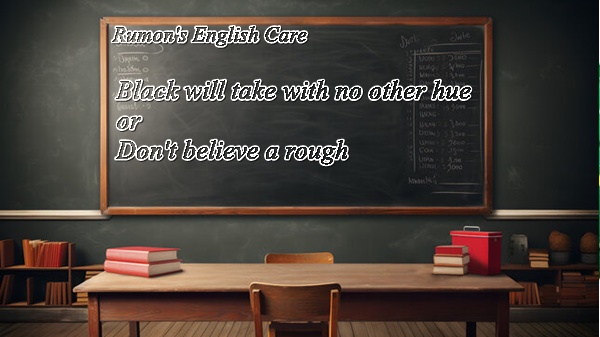Black will take with no other hue
Black will take with no other hue/ Don’t believe a rough
Once in a cold winter morning when a villager was going to his field he found a snake half dead with cold, lying by the side of the road. He felt a great pity for the miserable snake. He put it into his basket and brought it home. He placed it with care by a fire-place, gave it warm milk and made it comfortable. It was all right with it and it got quite well very soon. It began to play with the children of the farmer. For some time it played and behaved very well.
One day while playing with the children of the farmer, it bit one of them. Now, the farmer realised his mistake. Actually, what was inherent in its blood could not go off. He understood that an evil always remains an evil. So he became very angry and killed the snake with a stick.
“Oh,” cried the farmer with his last breath, “I am rightly served for pitying a scoundrel. The greatest kindness will not change the ungrateful.”
Translation:
এক শীতল শীতের সকালে এক গ্রামবাসী তার ক্ষেতের দিকে যাচ্ছিল। পথে সে দেখতে পেল একটি সাপ ঠান্ডায় অর্ধমৃত অবস্থায় রাস্তার ধারে পড়ে আছে। সাপটির এই করুণ অবস্থা দেখে তার খুব দয়া হল। সে সাপটিকে তার ঝুড়িতে করে বাড়ি নিয়ে এল। সে সাপটিকে খুব যত্ন করে আগুনের পাশে রাখল, গরম দুধ খাওয়াল এবং আরাম করে বসার ব্যবস্থা করল। অল্প কিছুক্ষণের মধ্যেই সাপটি পুরোপুরি সেরে উঠল। সে কৃষকের বাচ্চাদের সঙ্গে খেলতে শুরু করল। কিছুদিন সে ভালোভাবেই আচরণ করল এবং আনন্দে খেলাধুলা করল।
কিন্তু একদিন, খেলতে খেলতে সাপটি কৃষকের এক ছেলেকে কামড়ে দিল। তখন কৃষক তার ভুল বুঝতে পারল। আসলে যার রক্তে যেমন স্বভাব থাকে, তা সহজে যায় না। সে বুঝল, দুষ্ট প্রকৃতি কখনও ভালো হয় না। রাগে কৃষক লাঠি দিয়ে সাপটিকে মেরে ফেলল।
“আহ!” কৃষক শেষ নিঃশ্বাসে বলে উঠল, “আমি এই পরিণতির যোগ্য। এক দুষ্টের প্রতি দয়া দেখিয়ে আমি নিজেই শাস্তি পেলাম। যতই উপকার করো না কেন, অকৃতজ্ঞ কখনও পরিবর্তন হয় না।”
or,
Once on a winter morning, a villager was going to his field. On his way, he saw a snake on the side of the road which was half dead from the cold. Seeing the snake, he took pity on it. He brought the snake to his house in a basket. Then he took care of it by placing it next to a fireplace. He fed it hot milk and bananas. The snake got better very fast. Then it started playing with the villager’s children. For a while, it played and behaved well with them. One day the snake bit one of the villagers’ children while playing with them. After this incident, the villager realized his mistake. Indeed, he realized well, “Blood doesn’t betray. It has done what is its nature.” The villager got very angry by the work of the snake and killed the snake with a stick. While killing the snake, he said to himself, “I am giving it the reward it deserves for its work.” After the snake died, the villager said, “Black will take no other hue. The black remain black forever.”
Benglai Translation:
এক শীতের সকালে এক গ্রামবাসী তার জমিতে যাচ্ছিল। পথে সে রাস্তায় এক সাপকে দেখতে পেল, যা ঠান্ডায় অর্ধমৃত অবস্থায় পড়ে ছিল। সাপটিকে দেখে তার প্রতি গ্রামের মানুষের মায়া হলো। সে সাপটিকে একটি ঝুড়িতে করে বাড়িতে নিয়ে এল। তারপর আগুনের পাশে রেখে সে সাপটির যত্ন নিল। সে সাপটিকে গরম দুধ ও কলা খেতে দিল। কিছুক্ষণের মধ্যেই সাপটি সুস্থ হয়ে উঠল। এরপর সাপটি গ্রামের লোকটির বাচ্চাদের সঙ্গে খেলতে শুরু করল। কিছুদিন পর্যন্ত সাপটি তাদের সঙ্গে ভালো ব্যবহার করল এবং আনন্দে খেলল।
কিন্তু একদিন খেলতে খেলতে সাপটি গ্রামের লোকটির এক সন্তানকে কামড় দিল। এ ঘটনার পর গ্রামবাসী তার ভুল বুঝতে পারল। সত্যিই সে ভালোভাবে বুঝল, “রক্ত কখনও প্রতারণা করে না। যা তার স্বভাব, তাই সে করেছে।”
গ্রামবাসী সাপটির আচরণে খুব রেগে গেল এবং একটি লাঠি দিয়ে সাপটিকে মেরে ফেলল। সাপটিকে মারতে মারতে সে বলল, “আমি এর কাজের উপযুক্ত শাস্তি দিচ্ছি।”
সাপটি মারা যাওয়ার পর গ্রামবাসী বলল, “কালো কখনও অন্য রঙ নেয় না। কালো চিরকাল কালোই থাকে।”

